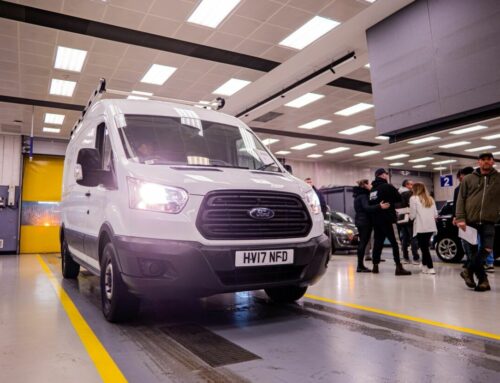World’s first ULEZ will operate from 8 April 2019 in Central London
- ULEZ will affect estimated 60,000 vehicles/day against 6,500/day by T-Charge
- 24-hour ULEZ 7 days/week will replace 5-day T-Charge
- NOx road transport emissions in central London estimated to fall by an additional 20% in 2019
- Consultation starting later this year on extending ULEZ to North/South Circular roads in 2021 for cars, vans and motorcycles
THE Mayor of London’s early launch for the London ULEZ in April 2019 – 17 months ahead of the original schedule – has been slammed by the Freight Transport Association and the BVRLA for being unfair to businesses as the FTA calls for extra time.
He made the announcement a week before consultation was due to end and a fortnight after the chair of London Assembly’s Environment Committee Leonie Cooper AM said it was going ahead on the launch of the capital’s T-Charge supplement to the Congestion Charge for higher polluting vehicles.
More than 18,000 Londoners responded to the Mayor’s public consultation on ULEZ – which was scheduled to run until November 10.
FTA’s head of policy for London, Natalie Chapman, said: “We are all in favour of taking every step possible to clean up London’s air, but the Mayor of London has failed to take into account the time needed for businesses to comply with these new regulations, without incurring significant costs that could put real strain on overheads and business security.
“By April 2019 there will only be two-and-a-half years’ production of vans available for operators to purchase, with little or no compliant second-hand market which will put pressure on operators already working to fragile margins.
“Residents based within the ULEZ have been given a period of tolerance, and we would ask for the same consideration to be given to the freight operators who keep London’s businesses and consumers supplied and working.”
The BVRLA agreed, saying in its consultation response and meetings with Transport for London, it had called for special consideration to be given to commercial vehicle operators, particularly SMEs.
BVRLA chief executive Gerry Keaney said: “The ULEZ will now come into effect 17 months earlier than originally planned and many commercial fleet operators will face a big financial challenge in trying to upgrade their vehicles ahead of schedule.
“Many of these operators will be small and medium sized businesses that rely on buying second-hand vehicles from larger fleets and can’t afford to go and buy a whole new Euro VI fleet at short notice.”
He added: “We need a carefully blended set of incentives and restrictions that removes the oldest, most polluting diesel vehicles without crippling our economy or punishing people for decisions they have already made.
“The vehicle rental and leasing industry has a significant stake in this transition and we look forward to working with local and national government to deliver a workable solution.”
BVRLA members own and operate a fleet of nearly five million of the newest and cleanest cars, vans and trucks. The association has produced a Fleet Air Quality Factsheet showing how the vehicle rental and leasing industry will be ready to meet the need of ULEZ-affected businesses and individuals from 2019.
Cities across the UK are set to follow in London’s footsteps by introducing their own clean air zones or other air quality measures. The BVRLA has called on the government to ensure that they follow a national framework ensuring consistent standards, signage and enforcement.
The Mayor of London, Sadiq Khan said: “London’s lethal air is one of the biggest health challenges of this generation,” adding: “We now urgently need the Government to step up and provide the support to Londoners and businesses required to help them meet these crucial standards.”
Last month Sadiq introduced the new Toxicity Charge (T-Charge) in central London to help deter the use of older more polluting vehicles, and encourage walking or cycling, or using public transport, in the build up to the ULEZ.
The T-Charge level is such that you could lease a new car or van for the T-Charge outlay alone.
However there has been criticism that the T-Charge is not signposted, the £10 supplement for older cars and vans automatically added to the Congestion Charge payment.
How much will it cost higher emission vehicles to enter London?
- ULEZ £12.50/day 365 days a year for cars, vans and motorbikes equating to £4,562.50 a year
- Added to £11.50/day Congestion Charge levied 5 days/week totalling £57.50/week or £2,990 a year
- Potential total cost £7,552.50 a year
- £100/day for lorries, buses and coaches
From April 2019 the ULEZ will replace the T-Charge and operate in the same area, alongside the congestion charge but (unlike the T-Charge and Congestion Charge, which are only in place on weekdays) it will operate 24 hours a days, seven days a week, 365 days a year.
There will also be two ULEZ charge levels: £12.50 a day for cars, vans and motorbikes and £100 a day for lorries, buses and coaches. These charges will be in addition to the Congestion Charge (C-Charge), so the more polluting cars and vans would pay £24 per day and lorries would pay £111.50 during C-Charge hours.
All revenue raised will be used by Transport for London to help maintain a greener transport fleet and reduce pollution across the transport network.
ULEZ will also affect thousands more vehicles, up to 60,000 every day, compared to the estimated 6,500 a day affected by the T-Charge. Diesel vehicles that do not meet the Euro 6 standards and most petrol vehicles that do not meet the Euro 4 standard will have to take action or pay.
Broadly, a four-year-old or newer diesel car will meet the requirement in 2019 when the scheme comes into force, making the ULEZ the tightest emission standard adopted in the world.
It is anticipated that behaviour change, similar to that seen following the T-Charge announcement where the number of motorists with older vehicles driving into the zone dropped significantly after the Mayor announced his plans, will mean some motorists will decide over the next 18 months to replace their vehicles with less polluting models which are not liable for the charge.
Renewed calls for Government scrappage scheme
Both the Mayor and the chief executive of the British Lung Foundation, Dr Penny Woods, have called for the government to introduce a scrappage scheme for more polluting vehicles, in addition to manufacturers’ voluntary schemes.
Dr Woods said: “Early implementation of the ULEZ could dramatically improve people’s quality of life and reduce the burden on health services. However, further and faster action from the government is still needed. Traffic is the major cause of filthy air.
“A targeted scrappage scheme is needed to help people move to cleaner vehicles. This must prioritise people on low incomes and those with health conditions who find it hardest to get around.”
The Mayor has also called on the Government to put in place a national vehicle scrappage scheme to help people replace vehicles affected by the proposals or switch to cleaner alternatives. There was overwhelming support for this in the first round of his consultation. He also wants fiscal incentives, like vehicle excise duty, to be reformed so they support his proposals and encourage people to own and use the cleanest vehicles.
Consultation to expand the ULEZ area
The ULEZ and T-Charge are just some of the hard-hitting measures the Mayor is introducing to improve London’s toxic air quality – he is developing proposals for a London-wide Euro 6 standard for buses, coaches and lorries in 2020 and expanding the area of the ULEZ for all vehicles (including, cars, vans and motorcycles) up to the North/South Circular roads in 2021. A consultation will start later this year.
TfL’s director for city planning, Alex Williams, said: “We are moving quickly to implement the Mayor’s bold proposals to improve air quality in the capital. Bringing forward the introduction of the central London ULEZ was popular with the public in the consultation and will be pivotal in dramatically reducing harmful emissions.
“It also gives drivers and businesses the certainty they need when deciding to buy new vehicles, as well as being a catalyst for people to make more sustainable travel choices.







I operate 2 vans and am expanding in the following year. Although I only get to London twice a week it is still an expense my business can ill afford. Like most small operations we operate tight margins and utilise older second hand vans that meet Euro 4 but not Euro 6 standards.
Given that the other week it took me 2.5 hours to cover 15 miles across London I feel this is yet another tax to fuel the coffers of the Mayor of London. The current congestion charge coupled with road changes and arbitrary ULEZ streets such as around City Road can lead to even more charges levied against the very companies who keep the city supplied.
I think we should organise a courier/delivery van company protest in London in the New Year to show the power we have as a group and that without us a huge number of businesses in London who rely on us every day will be the ones who suffer.